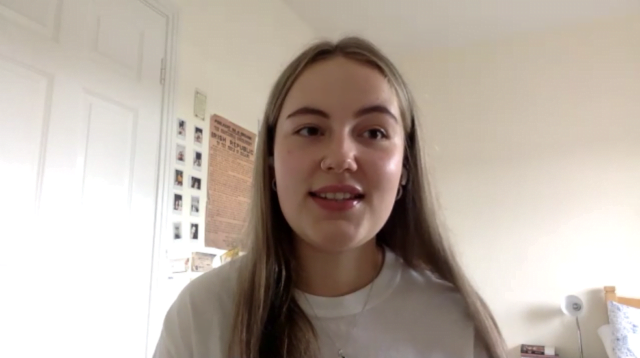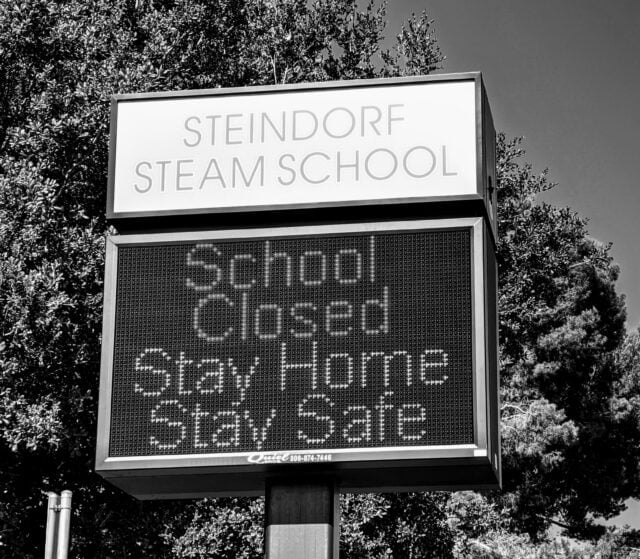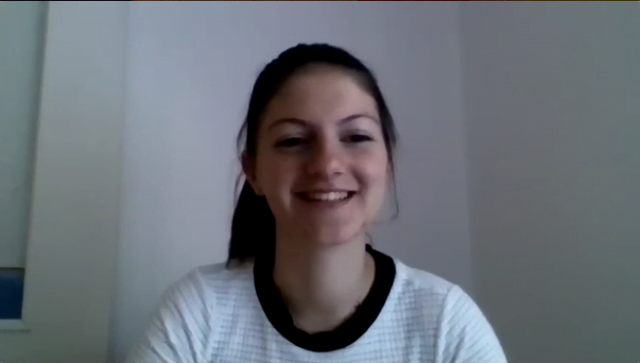Student voices: Fighting to be heard during the COVID-19 exam chaos
Year of production: 2020
Image is illustrative. "A Personal Commencement" by Phil Roeder is licensed under CC BY 2.0
‘The attitude was, “we’re going to decide everything and you’re not important”,’ recalls 18-year-old Maja Kalin about the way educational decisions were being made in the early days of COVID-19 in her home country of Slovenia. ‘The government said from the very beginning: “final exams are going to happen, and there is no question about this”.’
‘It was obvious that it was spur of the moment – “we need to make a decision right now”’, says 20-year-old Ciara Fanning, recalling the rapid changes made to the curriculum in Ireland, back in March. ‘If you were actually able to talk to students before you made these decisions, you would have been able to account for their concerns before decisions were made.’
Both women capture the tension of upholding the right to participate with the right to be protected in an emergency. When decisions need to be made quickly to safeguard the health of people, what obligation is there for decision-makers to ensure people’s voices are heard, including those of young people? How do participation rights apply to education?
While the spread of COVID-19 is an unprecedented health crisis, it is also a crisis in education, primarily for young people. According to UNESCO, governments in 194 countries around the world mandated nation-wide school closures in an attempt to contain the spread of the virus, affecting 91.3% of learners across the globe, or over 1.5 billion students at the peak of school closures on 4 April 2020. Closures had knock-on effects for all types of school-related decisions, from new teaching formats – including online methods – to the deferment of end-of-year exams.
‘The attitude was, “we’re going to decide everything and you’re not important.”’
Maja Kalin, President, School Student Organisation of Slovenia
Both Kalin and Fanning are deeply invested in these educational decisions, and the impact they have on the lives of students. Both are presidents of their national student unions, representing the entire secondary school population in their countries: Kalin, a new president who was just elected in October 2019 to Dijaška organizacija Slovenije (School Student Organisation of Slovenia), and Fanning, the outgoing president for Irish Second-Level Students’ Union.
‘Our big concern was that they still had a huge amount of curriculum to cover before the term end exams,’ Fanning explains. ‘We have little-to-none continuous assessment [in Ireland], so it’s all really based on your performance in June… We were very worried about people not getting their curriculum finished, and the exam papers had already been done up. What’s going to happen? There’s no way this exam can be done like normal.’

Slovenian students were similarly stressed about the gaps in education in advance of their exams.
‘There was a big question about the equality of all students – some didn’t have access to the Internet or computers’, noted Kalin. ‘From the very beginning, the Ministry [of Education] was collecting computers for schools from different companies and charities. It was a big concern for them. I can’t say that all of it [was resolved], but there was a lot of effort put in to addressing it.’
Participation in a state of emergency
The right for people to have a say and influence over issues that affect them, otherwise known as participation, is enshrined in the Universal Declaration of Human Rights, as well as in the Treaty of the European Union. Young people are no exception, and the right to be heard is codified in Article 12 of the Convention on the Rights of the Child – the most widely ratified international human rights treaty in history. The Committee on the Rights of the Child, which monitors the convention, emphasises that even in emergency situations, young people should be ‘encouraged and enabled to participate in analysing their situation and future prospects. [Participation] helps them to regain control over their lives, contributes to rehabilitation, develops organizational skills and strengthens a sense of identity.’ [CRC/C/GC/12, para. 125]
As elected representatives, both the School Student Organisation of Slovenia and the Irish Second-Level Students’ Union held large-scale surveys to canvass for student views on various COVID-19 related decisions. They asked their members about their main concerns, their needs, and feedback on the situation as a whole, with a question on what to do with final exams in particular.
In emergency situations, young people should be ‘encouraged and enabled to participate in analysing their situation and future prospects. [Participation] helps them to regain control over their lives, contributes to rehabilitation, develops organizational skills and strengthens a sense of identity.’
Even though Slovenia’s government decided early on in the crisis that the exams would go on as scheduled, the Student Organisation still held a survey in March, asking if students agreed with this.
‘Some students weren’t happy about [the government’s decision],’ says Kalin. ‘They felt that they weren’t being taken into consideration at all.’
In Slovenia, around 13,000 respondents completed the survey, with the students who responded being split on the issue. A total of 69% of respondents didn’t think that final exams should proceed as normal, but were split on how they should be changed. Respondents indicated preferences for making the exams easier, for example, by narrowing down the subjects they covered, removing the oral requirement, or lowering the criteria for passing the exams. Other preferences included simply postponing them, or even full cancellation.

In Ireland, the ISSU survey gave students only three choices to choose from:
- Exams should go ahead with social distancing;
- Exams should be postponed;
- Exams should be cancelled (meaning that final grades would be calculated based on past performance).
The ISSU received over 46,000 survey responses from students. A total of 19% of respondents called for exams to be postponed; 26% called for exams to go ahead with social distancing; and 49% called for exams to be cancelled.
Voice is not enough[1]
Respect for the right to be heard within education is fundamental to the realisation of the right to education, also enshrined by the Convention on the Rights of the Child. General Comment No. 1 (2001) provides further clarity on education rights and it makes it clear by stating that children and young people ‘do not lose their human rights by virtue of passing through the school gates’ (CRC/GC/2001/1, para. 8). Students, it follows, should be allowed to express their views freely in order to fully participate in school life.
Young people ‘do not lose their human rights by virtue of passing through the school gates’
(CRC/GC/2001/1, para. 8)
The Organising Bureau of European School Students Unions (OBESSU), a platform for cooperation between national secondary school student unions in Europe, such as ISSU and the School Student Organisation of Slovenia, advocates that students are the main stakeholders in the education system, with the right to participate in issues concerning their lives.
‘Students are the most important actors in education,’ says OBESSU Board Member Lucija Karnelutti.
She argues that it is students who have the perspective ‘in the field’, and students who shine the light on pressing issues that administrators may not have a feel for or understand.
‘Students are the most important actors in education’
Lucija Karnelutti, OBESSU Board Member
Giuseppe Lipari, another OBESSU Board Member, agrees. Both he and Karnelutti were involved in drafting OBESSU’s official reaction to the impact of COVID-19 on general secondary and vocational education. The document, written with feedback from the all its 31 national school student unions and published on April 3rd, outlines the main challenges facing secondary students in Europe, ranging from a lack of clear guidelines and standardisation from Ministries of Education to concerns about the psychological impact of the crisis on teachers, students and their families. It called for equity to be a top concern for governments, as disadvantaged learners were to be the most affected by the measures.
The document also makes clear the importance of student participation:
‘No decision about our future can be taken effectively without including school students. Student organisations should be consulted in all forms possible and cooperation between school actors in this moment should be a top priority.’
OBESSU Reaction to the Impact of Covid-19 on General Secondary Education and Vocational Education, 3 April 2020
You can’t place dissent under lockdown
Of course, expressing views is not enough – those views have to be listened to by someone with the power to enact change.
The ISSU took the survey results to an advisory group convened by the Department of Education, where the ISSU is a member together with representatives from the teachers’ trade union, principals’ trade union, and the parents’ union. However, in April, the Department did not pay much attention to the results of the survey, and decided to simply postpone the exams anyway, providing no clarity regarding the exact date.

‘That was really negative for us,’ says Fanning, noting that the postponement of exams to an uncertain date caused a wave of student stress. ‘It was a huge amount of pressure put on students […] We were getting a lot of messages from people very worried for their welfare and the welfare of their peers.’
‘I was really concerned that there were going to be suicides in the aftermath of that decision, because the high-stakes nature of that exam is really prominent,’ Fanning continued. ‘We brought that immediately to the Department [of Education] and they tried to launch psychological supports and made sure people did have access to that. But we knew that if that decision was the final one, no matter what we did, it was really bad for people with mental health.’
Unlike in Ireland, the student organisation in Slovenia was not invited to take part in any advisory groups relating to decisions on the final exams. Meetings were held at the Ministry of Education with principals and other senior bureaucrats, but students were not invited. And while the survey results in Slovenia were not conclusive on the issue of what should happen to the exams, it highlighted a lot of issues that were important to students.
The student representatives presented these issues in an open letter to the Ministry of Education and the State Exam Centre in charge of organising the exams. There was an initial response – for officials to meet with the students and have some discussions – but very little follow up happened after that.
Education officials went quiet.
So the student organisation went to the media, conducting interviews and holding press conferences, calling on the ministry to let students be more involved in these decisions, and to give more clarity.
‘The relationship is more like: we’re not being heard,’ explains Kalin. ‘But when we push our way, kind of “force” them to listen to us, that’s when things happen.’
‘I was really concerned that there was going to be suicides in the aftermath of that decision, because the high-stakes nature of that exam is really prominent.’
Ciara Fanning, Irish Second-Level Students’ Union
Putting agency back in the hands of the students
In Ireland, Fanning and the ISSU did not give up after the Department of Education’s initial decision to postpone the exams.
‘We, as an organisation, [had to show] that we could be very constructive…that we weren’t just “moaning”’, she explained.
Over the course of around 10 meetings of the advisory group – a long and drawn-out process – the ISSU continued to push for student issues to be on the table.
By late spring, significantly more was known about how COVID-19 spreads. Finally, in May, the Department of Education ruled to cancel exams – what students had indicated in the survey that they wanted the most – with the option of students accepting grades calculated thus far or taking the Leaving Certificates written examination at a later date, when it would be safe to do so.
Fanning was elated. Although she recognises that the changing nature of the pandemic made it more clear that exams were not going to be possible, she also sees the impact of student participation on the conversation.
‘I was so conscious [of the fact that] if I wasn’t in the room, that the students’ voice wasn’t being heard,’ she says. ‘And it wasn’t a deliberate move to exclude students. It was just a lack of comprehension from those who aren’t actually in the education system of what it’s like to be a young person.’
The final decision was one that put agency back in the hands of the students, at a time when many things about the pandemic felt completely out of our control, for everyone.
Gaining allies, and expanding influence
Throughout all of this, Kalin and the Slovenian student organisation forged an alliance with an unexpected group — their teachers. In the past, the teachers and students unions had not really cooperated, but during COVID-19, the Ministry of Education locked teachers out of meetings in the same way they did with students, preferring to deal primarily with principals and school administrators. Together, students held a press conference side-by-side with teachers, further boosting their own reach and influence.
‘It was just a lack of comprehension from those who aren’t actually in the education system, of what it’s like to be a young person.’
Ciara Fanning, Irish Second-Level Students’ Union
‘Students are often the forgotten group, but in this instance, both were forgotten,’ says Kalin. ‘We were advocating for the same thing: that more information should be given, and that the communication between our union, the teachers’ union, and the ministry should be better.’
In the end, the Ministry did not drastically improve the way it communicated with the students or the teachers. However, some changes were made by the Ministry that were highlighted in the open letter, such as classes not being extended into the summer months. While only the tip of the iceberg in terms of the demands laid out in the original letter, it was still a small win for the student organisation.
‘There were students complaining. There were teachers complaining,’ says Kalin. ‘[The final decisions] were definitely not because of the letter alone, but it still gave some insight [into the reality of the lives of students].’
Masks on, but still speaking out
Lockdown measures and school closures have impacted young people in a very personal way, leading many to engage in public policy – some for the very first time. From grassroots organising on exams, to calling in to radio and television shows to talk about their concerns, young people are paying attention to education decisions more than ever before.
‘We have never seen so much engagement from students as we have in the past three months’, explains Fanning. ‘[It’s] never gotten to this level.’
Kalin was also surprised by the groundswell of student activism in Slovenia.
‘We are used to students not participating,’ she says. ‘And even though some students went against the union [on some issues]… it was encouraging for me to see that they took a stance. I was glad to see students actually participate – to see an issue, and raise their voice about it.’
Students have also started looking for solidarity internationally – across borders – based on a common experience with lockdown and school closures around the globe. Student unions from Bangladesh to Italy have begun to link up over videoconference and social media, and a type of global student forum is starting to emerge.
‘The months of lockdown have given us this opportunity to link with other student unions around the world,’ says Lipari, from the Organising Bureau of European School Students Unions. ‘Building solidarity globally out of this crisis – it was totally unexpected.’
Fanning agrees, reflecting that the more young people’s lives are affected by policies, the more they want to assert their right to have a voice in them.
‘[Young people] have had a political awakening in a way,’ she says. ‘That has been a one really positive thing, out of a really negative circumstance.’
That might be the bright spot out of the pandemic, if one can be found.
[1] This is the title of an article by Laura Lundy (2005), which conceptualises a model of child participation comprised of four elements: Space, Voice, Audience, Influence. Without all four elements, participation cannot be considered meaningful or rights-abiding under Article 12 of the CRC. Lundy, L. (2005) ‘Voice’ is not enough: conceptualising Article 12 of the United Nations Convention on the Rights of the Child.





